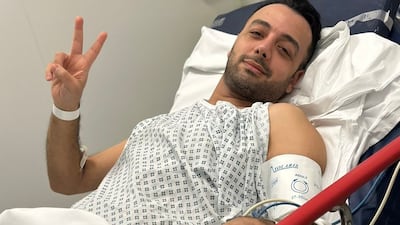For years, the UK has struggled to provide an answer as to why its security system is incapable of proscribing the Islamic Revolutionary Guard Corps. After an Iran International TV presenter was stabbed in London last week, Tehran’s most powerful overseas force is back in the spotlight.
The attack on Pouria Zeraati outside his home on Friday has left the city facing a humiliating breakdown of its credibility. Where the attack took place, Wimbledon, is one of London’s affluent and tranquil parts and world famous for the eponymous tennis arena.
Mr Zeraati held a high-profile role at the anti-regime satellite news broadcaster. It was reported on Saturday that his recent interview with Israeli Prime Minister Benjamin Netanyahu, who is orchestrating the war in Gaza, was the moment to single him out.
This explains the involvement of the Met Police’s Counter-Terrorism Command within hours of the attack.
Why the incident is devastating for confidence in London is that there was ample time to ensure the safety of those who work for Iran International. A big step in that direction would have been the IRGC’s proscription. But while the rhetoric from certain security officials was always strong, the follow-up was non-existent in the most essential sense.
Iran International has a number of global newsrooms. It was forced out of the UK, uniquely, for a spell last year and its operations only recently returned to full strength. It was unable to return to its former home in West London but established new facilities at an undisclosed location.
Ken McCallum, the head of the domestic security agency MI5, shocked many in his audience in late 2022 when he said that Tehran’s “aggressive intelligence services” posed a risk to lives in the UK. He said there were 10 direct threats that year alone – a figure that was later upgraded to 15 plots, with no let-up in the year and a half since.
It was dismaying, therefore, to watch divisions between government ministers over the issue spill out into the open during this period.
Senior figures such as Home Secretary James Cleverly and former defence secretary Ben Wallace aligned firmly against taking action against Iran. They presided over a system determined to maintain top-level inertia. When some senior diplomats defied the overall stance to push internally for a different approach, there was substantial pushback against expert advice.
The vulnerability to the IRGC has perpetuated in the face of this stalemate. In the aftermath of last week’s attack, there are glaring and horrific dangers that cannot be brushed away.
Evidence from recent plots in the US and Europe has accumulated over the months, yet nothing was a decisive factor for the UK’s decision makers.
In the European case, the courts prosecuted a multi-country network supporting an assassination plot in Paris that was overseen by a credentialed Iranian diplomat in Vienna. The foot soldiers recruited to carry out the attack were located for many years in the Netherlands before activation.
FBI court documents in the US show the efforts that the Iranian regime has put into recruiting killers from American criminal gangs. These plots, now going through the courts, show the methods and means that the regime has used to target and stage attacks on its enemies.
The network of influence that Tehran runs in the UK has also surfaced, and hence there have been calls for a clampdown on the regime’s activities, particularly at universities and within community centres.
Mr McCallum spoke again about Iran’s activities last October, after the start of the Israeli offensive in Gaza. He said that there was already a “particularly intensive phase of Iran-generated threat on UK soil”. With events, he cautioned, things could move in new directions.
Strong words – but aside from more resources being allocated to increase surveillance of the comings and goings related to Iran at the UK borders, nothing tangible has been done in terms of the overall approach to Iranian activities.
The root of all this remains the dividend that Tehran has drawn from decades of tense but deeply intractable negotiations with the West. The priority placed by the big European powers on finding a solution to Iran’s nuclear programme has resulted in a systemic override on other security concerns.
This was true when Iran manipulated the Yemen civil war into being – something that has now blown back on the West with the Red Sea crisis – and this remains the case with the regime’s embedded and functional threat network within the UK.
Tackling these issues is something that is getting lip service from the highest levels. But the negotiations trap that London has fallen into has proved to be damaging to its own interests – and this isn’t just on the nuclear front, where Tehran is crossing one threshold after another.
It is little wonder, then, that so many concerns centre on Iranian impunity in London.


